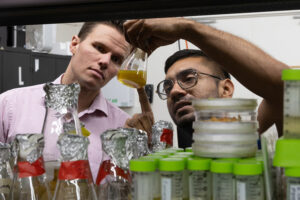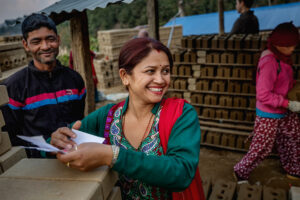'Conscious' of the Planet
June 13, 2024
Above: Ishita Juluru, Frances Benfell and Hannah Rogers and co-founders of the climate app Conscious.
"No one has to be perfect," says Frances Benfell, co-founder of the climate app Conscious. "[I]t's about finding where it's reasonable for people, because no one should have to be breaking their back to be perfect. Instead, we want people to think: what can you actually feasibly fit into your life?"

Hannah Rogers, co-founder of the climate app Conscious
A student at the University of Utah, she along with co-founders Hannah Rogers and Ishita Juluru have been awarded the prestigious Wilkes Student Climate Innovation Prize. The prize was awarded at the second annual Wilkes Climate Summit at the U in May.. The innovative project aims to reform consumer behavior towards sustainability by empowering individuals to make informed choices and take meaningful action against climate change.
Conscious seeks to bridge the gap between producers and consumers in the realm of sustainable consumption. Set to undergo development this summer, the app will provide users with essential information about the environmental footprint of products through a simple barcode scanning feature. From carbon emissions and water usage to sustainable alternatives, Conscious will equip consumers with the knowledge needed to make eco-conscious purchasing decisions.
"Basically, we just want to make climate conscious consumption really easy for people because there's a huge information gap between producers and consumers," explains Frances Benfell, one of the Conscious’s creators. "So we're creating an app that will allow you to scan a barcode and see a product's carbon footprint, how much water was used, where it was made, and where it's shipping from. And then it will give you a list of third-party vetted alternatives that have a lower carbon footprint that you can purchase directly within the app."
Beyond its goal to provide consumers with easily accessible information, Conscious aims to foster engagement among its users to drive real change. In addition to its barcode scanning feature, the app will incorporate gamification elements, allowing users to participate in challenges and competitions with friends, colleagues, and community members.
"We're also ‘gamifying’ the process so you can be on different leaderboards, at your workplace or at your school or with your friends," adds co-founder Ishita Juluru who graduated in May in computer science with honors and a minor from mathematics "and also compete with your friends in different challenges, like a Clean Air Challenge or sustainable Christmas shopping challenge. You’ll be able to see your contributions in comparison with others, which will motivate people to be more engaged."
Reducing ego anxiety
The project started with its creators’ frustrations surrounding the difficulty and hopelessness they felt trying to take climate action. "I think climate change is really isolating sometimes, especially in Utah," shares Benfell. "There's a lot of times where I feel like I'm in a room where I'm the only person who cares. And it's really nice to be able to see all the other efforts people are making. You can reduce ego anxiety by making better decisions, but also seeing that other people are trying too, and not feeling like you're alone in the fight."
The Wilkes Student Climate Innovation Prize will provide crucial support for the development and launch of Conscious. Despite initial setbacks with their software developer, the team is now back on track with two dedicated software engineers, including Juluru.
Launching initially in the U.S., Conscious will focus on wealthy industrial countries where companies and consumers play significant roles in driving climate change. With plans to expand globally, the app will eventually provide tailored resources and information unique to every state.
“We want to have comprehensive resources that show, ‘here’s all the places you can learn about the legislative session; here's where you can learn about where your representatives stand on climate issues,” says Benfell.
Disrupting the status quo

The Conscious team
Conscious aims to disrupt the status quo of consumerism by empowering individuals to leverage their purchasing power against major climate contributors. By steering consumers away from unsustainable companies, Conscious seeks to send a powerful message and drive systemic change. “The idea is not about people ‘righting their wrongs’ or not being ‘sustainable enough.’ It's more about sending a message to those major climate contributors. Because if we're shifting demand away from high-polluting companies, then we're hurting their bottom line, which they care about a lot more than the environment,” explains Rogers. “There is huge value in putting your money where your mouth is. Yes, you can vote for change in our government. But the biggest way that you vote is what you buy.”
Conscious represents a new frontier in sustainable consumerism, where every purchase becomes an opportunity for positive environmental impact. As the app gears up for development, its creators are poised to lead a movement towards a more sustainable future, one purchase at a time.
by Julia St. Andre
>> HOME <<




